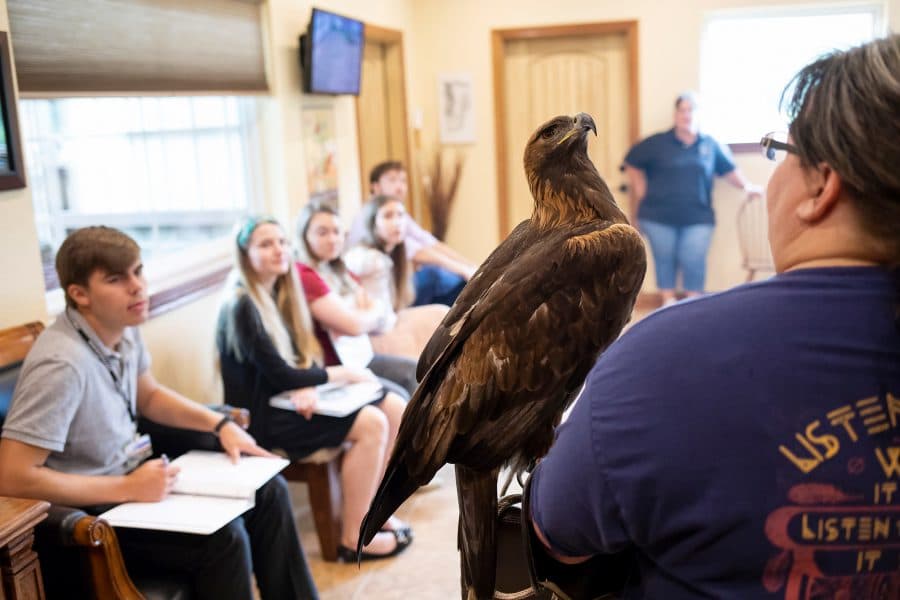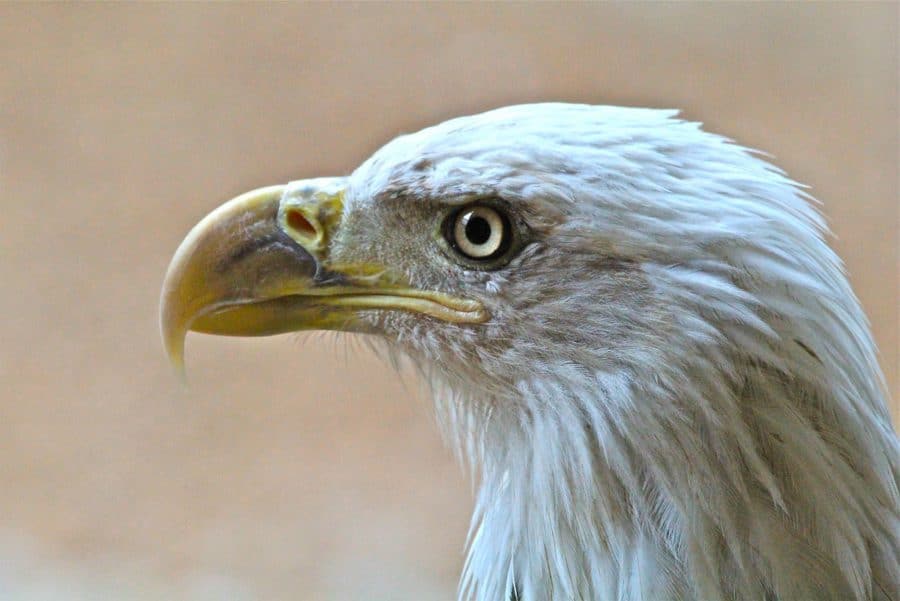Citizen Potawatomi Nation Eagle Aviary Manager Jennifer Randell and Assistant Manager Bree Dunham have been the aviary’s sole two employees since its opening in 2012. Both Randell and Dunham are proud of the Nation’s efforts to provide a permanent home for injured birds of prey. They employ sound animal husbandry practices that create a safe, enriching environment for the eagles and help educate the public about Potawatomi culture.

Learn more about the CPN Eagle Aviary with these frequently asked questions.
How can individuals or groups schedule a tour?
The best way to schedule a tour is to call 405-863-5623 or message the CPN Eagle Aviary on Facebook, @CPNeagleaviary. Please note, it may take several days to receive a reply. If looking for a specific date or time, staff encourage submitting requests at least three months in advance. The aviary only has two employees who often present to schools and other groups. Because of the staff’s tight schedules, the earlier someone reaches out about a tour or demonstration, the more likely they will be able to meet the request.
What days of the week do tours usually occur?
Tours are usually held on Thursday, Friday and Saturday.
How long do tours last?
Tours last 45 minutes to one hour for smaller groups and up to 1.5 hours for larger groups.
Why can’t CPN tribal members, CPN employees or members the public show up to the aviary without scheduling a tour or speaking with aviary staff ahead of time?
Aviary staff often give offsite presentations as well as tend to injured birds, eagles or other animals found in the area. They occasionally drive wounded wildlife to rehabilitation centers and pick up eagles in locations across North America. When new eagles and other birds of prey arrive to the aviary, it’s important they have the quiet space needed to acclimate safely.
Many CPN members utilize the aviary to hold ceremony or to pray with the eagles, and it is impolite to interrupt. As a sign of respect for staff, CPN members and the eagles, always call ahead and speak with an employee before traveling to the aviary.
Will the aviary’s entrance gate be open if a tour has been scheduled?
No, the CPN Aviary’s entrance gate is always closed for safety reasons. Simply pull up to the gate, and the staff will open the gate for you.

What is an eagle pellet?
As carnivores, eagles eat only meat and consume the entire animal. Their strong stomach acid can break down small bones, but they cannot digest feathers, fur and other material. Whatever body parts eagles and other birds of prey do not process are regurgitated in a bundle called a pellet.
What is the leading cause of injury of the eagles that the CPN Aviary takes in?
Most of the eagles come to CPN due to injuries from vehicle collisions. In the winter when food resources are low, eagles will consume carrion, which oftentimes are animals killed by a vehicle and found along roadsides. After eating, eagles, hawks and other birds of prey may not be able to clear the roadway during takeoff. The added weight can cause them to collide with vehicles. The aviary also often works with eagles that have suffered from electrocution, lead poisoning and gunshot wounds.
What should someone do if they come across an injured eagle?
If the injured eagle is in Oklahoma and near CPN’s jurisdiction, calling the aviary at 405-863-5623 is a great place to start. Also, dialing the CPN Police Department at 405-878-4818 is another option. If an eagle is found far away from CPN’s jurisdiction or in another state, aviary staff suggest calling the local game warden or wildlife department.
For other injured animals, staff recommend calling WildCare at 405-872-9338. WildCare is a nonprofit wildlife rehabilitation center located in Noble, Oklahoma, and the CPN Aviary regularly partners with the organization to care for rescued animals.
